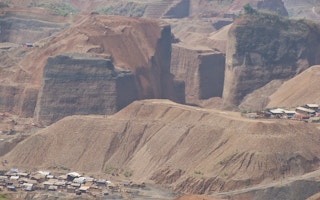The death toll from a landslide at a jade mining site in northern Myanmar’s Kachin state over the weekend has reached at least 113 people, official media reported Monday, and more than 100 others remain missing as recovery efforts continue.
According to the Global New Light of Myanmar, at least two women were among the dead and “many laborers remain missing” in the aftermath of Saturday’s disaster in Hpakant township, which buried some 70 makeshift huts located in a ravine comprising two 200-foot (60-meter) mountains of dump soil.
“Our guess is that there are at least two miners in every hut,” an official from the Hpakant township General Administration Department told the New Light.
“We know that around 70 huts were buried by the landslide. We believe there are another 30 victims under the soil. We will continue our rescue efforts tomorrow.”
According to the report, nine bodies were recovered on Sunday, while another victim was rushed to a local hospital, but died on arrival. The number of dead has made the landslide the worst such disaster in the mining community in recent memory.
The soil was dumped by mining companies last year and had attracted a large number of migrant miners searching for lesser quality jade the firms discarded, the report said, adding that authorities had designated the area as a high risk spot for landslides and notified people not to set up huts there.
The Guardian quoted township administrator Nilar Myint as confirming the death toll at 113, adding that more than 100 people remain missing.
The report cited local officials who said the accident occurred at about 3:00 a.m., burying the huts while the miners slept.
The mining industry has taken off in Myanmar since the country’s former military regime handed power to President Thein Sein’s quasi-civilian government in 2011, leading to the lifting of many western-imposed sanctions.
According to a study released last month by London-based Global Witness, despite growing political reform in Myanmar, the country’s jade industry is still tightly controlled by a network of former generals, drug lords, and crony businessmen who keep the sector’s vast profits exclusively for themselves.
Major players in the estimated US $31 billion trade include former junta chief Than Shwe and senior figures in Myanmar’s ruling and military-dominated Union Solidarity and Development Party, the report said.
Global Witness said that an openly and equitably managed jade mining industry could greatly benefit the ethnic Kachin people and help drive development across Myanmar, but instead, “the people of Kachin State are seeing their livelihoods disappear and their landscape shattered by the intensifying scramble for their most prized asset.”
Dozens of small-scale miners have been injured or killed picking through the dangerous waste dumps in Hpakant over the last year, and Global Witness said that those who oppose the jade mining industry in the area “face land grabs, intimidation and violence.”
Up to 90 per cent of the world’s jadeite is mined in Hpakant—most of which ends up for sale in China.
Drug abuse is rampant in Hpakant, with heroin and methamphetamine easily available as a side effect of Myanmar’s high-stakes narcotics trade.










